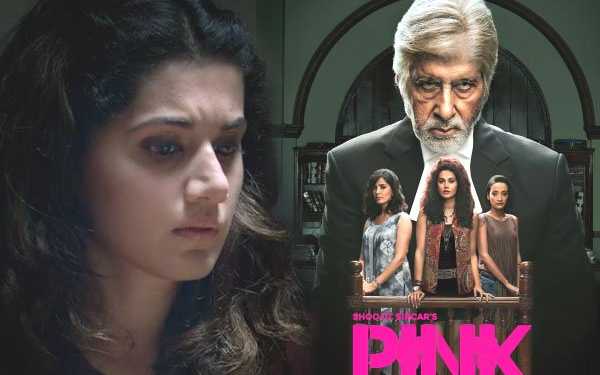I am no film critic and therefore this is not a review of Pink. But Pink is that movie that has made me feel there are millions of men and women who are screaming. Maybe none of us hear that scream like we don’t hear a woman saying no, but that scream is reverberating around me.
As I write, my eyes are still glazed, the goose bumps are still there; reminding me to thank the makers of Pink.
In a country where you are either a behenji in a salwar kameez or a slut in a short skirt, where debates on marital rape make trolls work overtime Pink is the film we need.
To everyone who has made a rape joke or has diluted the idea of consent (irrespective of gender) go take a mirror and look at it. There is that Rajvir in you, that policewoman or that lawyer in you that wears the moral police cap whenever a woman talks her mind; whenever she talks about consent.
A woman in a micro mini can’t be raped because she is asking for it. A wife can’t be raped by her husband because they are married and she has to grant him ‘conjugal rights’. A prostitute can’t be raped because she earns money by soliciting sex.
As Amitabh Bachchan, the aging lawyer says, it is men who get into trouble because of the way we dress, so let’s find an easy way. Let us cover the women in purdahs, let’s take away the mobile phones, let us deprive them of education; because all of these are landmines of sexual provocation and we don’t want our precious ‘men’ to get into trouble.
I have lived alone in two cities. In Hyderabad, my landlord had reminded me that no men would be allowed in my home. Because which good girl lets men come in?
In a country where ‘a boy and a girl can never be friends’ is used as the ultimate romantic catch line, akeli ladki ke angne me ladko ka kya kaam hai? And the other kaam, desire that is, is only for married people. If you are single and have desire you are either a fallen woman or a tharki man.
Because we are sanskari. So sanskari that every day the newspaper finds a space for news of rape. Whether the rape is of a six-month-old or of a sixty-year-old woman, it is the woman’s fault. Why have a vagina? Why excite men?
While I was living alone in Kolkata, a female colleague had nonchalantly told friends at the work place that I must be having multiple sexual partners. Why would I, then a twenty-seven-year-old be single? Why didn’t my parents let good sense take over them and get me married?
Another female acquaintance had a cousin entangled in a complicated relationship. The man had forced himself on her, but the acquaintance refused to accept it as an act of rape. She was already sleeping with him and he had every right to have sex with her even if they were amidst an ugly fight.
So there is no concept of consent and a woman living alone are of bad morals and worse character.
In Pink, Rajvir the man who is almost unable to keep it in his pants is just a name. There is a Rajvir all around us. The men that think sharing a drink, watching a movie or a phone number gives them the license or the ownership of the body of a woman are aplenty.
When Rajvir says women of good households don’t drink and those that drink deserve the kind of treatment he and his friends had in mind.
Yes. True. But our sanskari samaj forgets to mention the fact that in the majority of the cases of rape the attacker is known to the victim; sometimes it is someone within the family. The parda nasheens aren’t really that safe.
Why do these men have such a fragile ego? Ever wondered why that devil wakes up the moment a woman says no? Is it that ‘ladke kuch bhi kar sakte hai’, ‘laaj sharam ladkiyo ka gehna hai’ etc etc that does a salsa with the devil and makes them pounce on women?
Isn’t it time to think about how we are bringing up our boys? And who is bringing up these boys? Women. So why not stop this gender war and ask women why it is so difficult for them to stand by another woman?
Why do we teach our boys to not cry, not play with kitchen sets, not play with dolls, not wear Pink? Why is a man that shares the household chores considered a lesser stud? Why can’t men choose to cook over playing football?
Pink talks about single women living in metros, of making choices of clothes, late nights and about consent; but goes much beyond and makes us ask questions.
What is the use of Mars missions and then branding women as Mangliks and heap them with insults and bizarre rituals? What is the use of segregating sons and daughters all their lives and then expect them to present the blood soiled bed sheet after the ‘wedding night’ is over?
Pink also leads us to the lazy argument that education ‘cures’ society and its evils. The man accused, the Rajvir that molests Minal has read Economics and has gone to a ‘foreign’ university.
The man Falak loves, is a professor. And one night changes all they have learned. Because no book will teach you to kill your sense of patriarchy or sense of entitlement.
Without going into stereotypes Pink also shows us that good landlord who refuses to throw the three girls out of his house, even though he gets a threat call and is thrown off his scooter.
And then there is also the neighbor that doesn’t forget to say ‘ladkiya akeli rahengi to aise hi hoga’. Yes. Of course. Aise hi hoga. Because we don’t care what happens to women behind closed doors.
The courtroom drama is almost taut, a rare characteristic in a Bollywood movie. The character assassination of Minal, Falak and Andrea – the north-eastern girl who could be from Arunachal Pradesh, Sikkim, Manipur or any of the eight states. The girl who is automatically expected to be loose and ‘westernized’ and therefore which state she comes from is an important question the lawyer doesn’t forget to ask.
As Bachchan goes to describe Meghalaya, my home state, he sarcastically says it must be very important to the case as none of the males are asked if they are from Rajasthan, Haryana, etc. That leads us to another question.
When will the ‘mainland’ finally stop patronizing or stereotyping eight states?
The storytelling is extremely smart and doesn’t get into the maze of telling and retelling what happened on that fateful night. We get to know only when the end credits start rolling. The lack of visuals makes the viewer guess, imagine and wait for the truth. The screenplay is a manual of ‘how not to preach’ and yet tell a moving story. The performances by Tapsee Pannu, Kirti Kulhari, and Andrea Tariang will be remembered for a long time. The mix of strength and vulnerability is so relatable that you almost start living their characters and loving them too.
Angad Bedi and his group nail it with their portrayals of entitled menacing men and so does Piyush Mishra as the lawyer who will ask any uncomfortable question, even brand women to win a case. And then we have Amitabh Bachchan the lawyer with the bipolar disorder, the man who is probably in his seventies but is more ‘modern’ when it comes to consent. His closing argument, ‘she said no’, where he stresses on the fact that NO is a complete sentence.
No means she doesn’t have consent. How women wish there were the ‘urban’, ‘cool’ men that realized this. No means no.
The movie Pink is undoubtedly a must watch and deserves all the adulation it is getting. The makers have done a wonderful job, they have opened wounds, have opened questions and have brought the debate on consent back on the table.
No means No. She could be your girlfriend, wife, fiancé, friend, classmate, neighbour, stranger or even a prostitute. No means No.
We hope men someday start differentiating between consent and non-consent and women stop judging their own gender because the choice other women makes is different from them.
P.S. Be it a Swathi or a Nirbhaya or a Lakshmi nothing has changed for women. Be it a Brock Turner or a Pachauri or the Ola cabbies that raped and killed a twelve-year-old in Kolkata the story is same, the characters keep changing. Will men take up the challenge and kill the demons within their gender? Can we stop putting egos before consent?



























